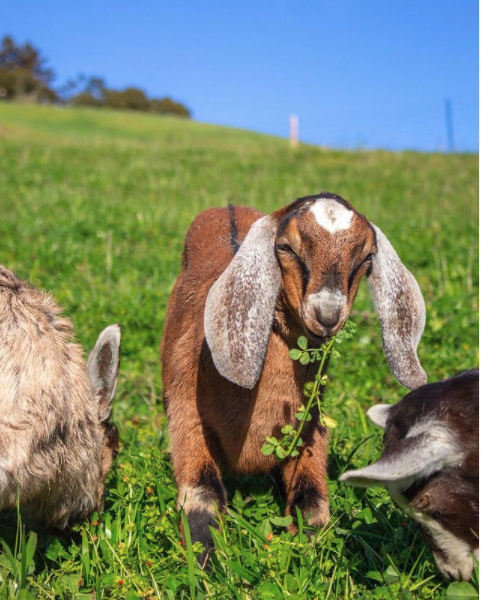Category - Zero Foodprint
Modified - 3/28/21 Zero Foodprint Restore Grants
Modified - 3/28/21 Zero Foodprint Restore Grants
 Summary: Zero Foodprint is proud to help farms like Twisted Fields boost their productivity through regenerative rather than extractive management.
Summary: Zero Foodprint is proud to help farms like Twisted Fields boost their productivity through regenerative rather than extractive management.
San Gregorio (San Mateo County)— The ZFP team is pretty excited about all fourteen of the farm projects we approved for Restore grants last month, but one name particularly intrigued us: Twisted Fields. So we asked farmer Daniel Theobald to tell us more about his work on the California coast, and his answer reveals a lot about the cutting edge of sustainable agriculture.
“A lot of times, farming is done in straight lines because it’s the easy thing to do, not the right thing to do,†Daniel said. Even slight slopes in a row cropping plan can lead to erosion, because water will wash topsoil away instead of sinking down into the ground where it’s needed. So even though designing a complex pattern of curvaceous yet level rows would entail some fairly sophisticated technology, he said, “we decided to allow the rows to be twisted to align with the contours of the land.â€
Luckily, Daniel had cultivated a passion for computer science while growing up in nearby San Jose, and he was able to bring his expertise from the robotics space to agriculture. “I was fortunate to have incredible access to resources and opportunities that many people don’t,†he reflects. In high school, Daniel was named the top computer science student California, which opened doors to robotics labs at Livermore Labs and later MIT, but he “always felt that tech should be for the betterment of the planet and all of us living on it.â€
Twisted Fields was founded in 2016 as a research farm in San Mateo County, where tech efficiency and sustainable farming could come together. One of the most exciting products of this effort is “Acornâ€--a light-weight, solar-powered, open-source precision farming rover—but Twisted Fields is much more than row crops and robots. In fact, Daniel will use Restore grant funding to implement a very ancient practice: composting to restore soil health.

“We’re going to apply a thin layer of organic compost to the soil in the fall. That dramatically increases the amount of biological life that can thrive through the winter and into the spring. The amount of carbon that can be captured is actually pretty astounding, but we’ll also get much more productive soil.â€
A Restore grant from Zero Foodprint will fund compost application on 9 acres of pasture where Twisted Fields grazes chickens and goats. Applying compost will kickstart the underground ecosystem, increasing plant growth and nutrition for the chickens whose multi-colored eggs are the farm’s primary commercial product. In addition to being adorable, the goats are happy to munch on practically anything, including native plants like poison oak that the chickens won’t touch--but the hens love goat milk, meaning that they get the benefit of a wider variety of nutrients with help from the goats.
“The Restore program allows us to kickstart the soil processes to a healthy place,†Daniel said. “It’s not something that can be addressed through normal market forces. Sometimes, like the soil, you need a kickstart to help get going down the path of a long term solution.â€
Zero Foodprint is proud to help farms like Twisted Fields boost their productivity through regenerative rather than extractive management.
We like to think of producers and consumers as equally intertwined in a mutually beneficial food system, like chickens and goats coexisting in a balanced ecosystem where healthy soil supports healthy creatures who support each other.
« Prev Next »
“A lot of times, farming is done in straight lines because it’s the easy thing to do, not the right thing to do,†Daniel said. Even slight slopes in a row cropping plan can lead to erosion, because water will wash topsoil away instead of sinking down into the ground where it’s needed. So even though designing a complex pattern of curvaceous yet level rows would entail some fairly sophisticated technology, he said, “we decided to allow the rows to be twisted to align with the contours of the land.â€
Luckily, Daniel had cultivated a passion for computer science while growing up in nearby San Jose, and he was able to bring his expertise from the robotics space to agriculture. “I was fortunate to have incredible access to resources and opportunities that many people don’t,†he reflects. In high school, Daniel was named the top computer science student California, which opened doors to robotics labs at Livermore Labs and later MIT, but he “always felt that tech should be for the betterment of the planet and all of us living on it.â€
Twisted Fields was founded in 2016 as a research farm in San Mateo County, where tech efficiency and sustainable farming could come together. One of the most exciting products of this effort is “Acornâ€--a light-weight, solar-powered, open-source precision farming rover—but Twisted Fields is much more than row crops and robots. In fact, Daniel will use Restore grant funding to implement a very ancient practice: composting to restore soil health.

“We’re going to apply a thin layer of organic compost to the soil in the fall. That dramatically increases the amount of biological life that can thrive through the winter and into the spring. The amount of carbon that can be captured is actually pretty astounding, but we’ll also get much more productive soil.â€
A Restore grant from Zero Foodprint will fund compost application on 9 acres of pasture where Twisted Fields grazes chickens and goats. Applying compost will kickstart the underground ecosystem, increasing plant growth and nutrition for the chickens whose multi-colored eggs are the farm’s primary commercial product. In addition to being adorable, the goats are happy to munch on practically anything, including native plants like poison oak that the chickens won’t touch--but the hens love goat milk, meaning that they get the benefit of a wider variety of nutrients with help from the goats.
“The Restore program allows us to kickstart the soil processes to a healthy place,†Daniel said. “It’s not something that can be addressed through normal market forces. Sometimes, like the soil, you need a kickstart to help get going down the path of a long term solution.â€
Zero Foodprint is proud to help farms like Twisted Fields boost their productivity through regenerative rather than extractive management.
We like to think of producers and consumers as equally intertwined in a mutually beneficial food system, like chickens and goats coexisting in a balanced ecosystem where healthy soil supports healthy creatures who support each other.
To find Twisted Fields eggs: www.twistedfields.com/customers
To apply for a Restore Grant: www.zerofoodprint.org/apply

